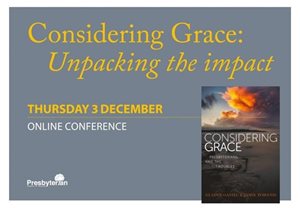Welcoming the fact that the conference, entitled ‘Considering Grace – unpacking the impact’, was able to take place, PCI’s Moderator, Rt Rev Dr David Bruce, said, “While there remains little consensus around how the state and its institutions should deal with the legacy of our collective past politically, legacy is more than politics. While it is a sorely contested space, we should not forget, that it is primarily about people and their healing, and ultimately forgiveness on a road to reconciliation, something that we all have a part to play in – especially those of us who profess a Christian faith.
 “Through the Considering Grace project, and the process that we have engaged in as a Church, we hope to contribute to an important wider discussion on dealing with the past, reconciliation and forgiveness. This event is the latest chapter in that process. It is my prayer that through today’s conference and interaction, we would find a set of insights which will do us good, even if to implement them might demand much of us.”
“Through the Considering Grace project, and the process that we have engaged in as a Church, we hope to contribute to an important wider discussion on dealing with the past, reconciliation and forgiveness. This event is the latest chapter in that process. It is my prayer that through today’s conference and interaction, we would find a set of insights which will do us good, even if to implement them might demand much of us.”
Originally planned as an ‘in-person’ conference in March, but postponed due to the onset of the Coronavirus pandemic, over 120 people took part, listening to keynote speakers, the Belfast-born Chief of Staff to the Archbishop of Canterbury, Canon David Porter and Very Rev Professor Stafford Carson, Principal of PCI’s Union Theological College. Those watching online also took part in a Q&A session with Dr Gladys Ganiel and Dr Jamie Yohanis, the book’s authors, along with Dr Nicola Brady, General Secretary of the Irish Council of Churches, who contributed to the book and the keynote speakers.
Taking part from his home in England, Canon David Porter unpacked the impact of ‘Considering Grace – Presbyterians and the Troubles' for wider society. Reflecting on the book and how it also resonated with his own story growing up as a Presbyterian in east Belfast during The Troubles, he said, “Nowhere is our citizenship in the Kingdom of God put to the test more than in how Jesus calls us to respond to those who do us harm. Those who hate, slander and malign us, who persecute, who kill the body but cannot kill the soul.
.jpg.aspx?width=300&height=168) “In a world where a culture of death and vengeance fuels conflict and suffering in a thousand valleys from the Hindu Kush to the Beqaa Valley, from the Jordan Valley to the Great Lakes of Africa, we are to be those who choose life. Whose impossible burden is to love, forgive and let mercy triumph over judgement.”
“In a world where a culture of death and vengeance fuels conflict and suffering in a thousand valleys from the Hindu Kush to the Beqaa Valley, from the Jordan Valley to the Great Lakes of Africa, we are to be those who choose life. Whose impossible burden is to love, forgive and let mercy triumph over judgement.”
Canon David continued, “How can this be? Only by considering grace. As citizens whose Sovereign Lord is God, who is rich in mercy and great in love. We are called to be nothing more and nothing less than citizens of a revolutionary kingdom in whom the grace of our Lord Jesus Christ is always with us.”
Having discussed the impact of the book for wider society, Considering Grace also raises a number of challenges for ministry and witness in PCI itself. Professor Stafford Carson talked about the impact of the book in this context. During his presentation he spoke of how Considering Grace related to forgiveness, justice and reconciliation, how PCI needed to take a lead in peace making and bridge building and how the Church needs to support and encourage its ministers and elders as they provided pastoral care to those who still suffer as a result of conflict. He also discussed the spiritual resources that are important in helping people heal.
.jpg.aspx?width=300&height=168) The former Moderator said that he believed Considering Grace was a significant contribution to the growing body of literature on The Troubles. “In particular, by documenting the experience of Presbyterians it begins to fill a significant gap in reflections and testimonies from the Unionist/Protestant perspective. The accumulation of individual stories helps us to appreciate the complexity of the pattern of violence in Northern Ireland, the way in which individuals and families have been affected, and the multi-dimensional nature of the conflict.
The former Moderator said that he believed Considering Grace was a significant contribution to the growing body of literature on The Troubles. “In particular, by documenting the experience of Presbyterians it begins to fill a significant gap in reflections and testimonies from the Unionist/Protestant perspective. The accumulation of individual stories helps us to appreciate the complexity of the pattern of violence in Northern Ireland, the way in which individuals and families have been affected, and the multi-dimensional nature of the conflict.
“And in particular, Considering Grace stimulates ministers and PCI members to think again about how they might respond to the deep divisions and massive injuries that have been inflicted on this community. It also raises issues that require further study and reflection, especially from a theological perspective. In commending its readers to “consider grace” we need some more reflection on what an orientation to the grace of God in Christ actually means theologically and pastorally as we seek to respond to the pain and hurt and sorrow that has resulted from the Troubles,” he told the conference.
“It is clear that forgiveness lies at th e heart of the gospel, and alongside it, it is also the clear command of Christ the we are to love our enemies and forgive one another, as God in Christ has forgiven us. While all this is true, I cannot deny that it is not easy. It is hard, costly and painful, especially for people who have experienced cruelty, abuse and hurt. In commending people to consider grace, the Church must also explain both the challenge of offering grace and the complexities of forgiveness as well as its commitment to justice and truth.”
e heart of the gospel, and alongside it, it is also the clear command of Christ the we are to love our enemies and forgive one another, as God in Christ has forgiven us. While all this is true, I cannot deny that it is not easy. It is hard, costly and painful, especially for people who have experienced cruelty, abuse and hurt. In commending people to consider grace, the Church must also explain both the challenge of offering grace and the complexities of forgiveness as well as its commitment to justice and truth.”
During the interactive Q&A session, the panellists, chaired by PCI’s public affairs officer, Karen Jardine, commented on a range of issues and questions from how to create space for conversations on dealing with the past to the role of psalms in lament. Questions were also asked around the issue of being faithful to scripture in terms of an individual’s ability to forgive and how the new generation of younger ministers, who did not minister through the Troubles, should approach ministering to those who did.
.jpg.aspx?width=300&height=168) Rev Dr Tony Davidson, minister of First Armagh Presbyterian Church, and convener of PCI’s Peace and Reconciliation Panel, who has led the Considering Grace project, thanked everyone for their contributions during the two-hour online event. “With so much unfinished business around the legacy of our past, it is our hope that the book, together with this online event, will contribute over the longer term, to an important wider discussion inside our Church and in society on dealing with the past, reconciliation and forgiveness.
Rev Dr Tony Davidson, minister of First Armagh Presbyterian Church, and convener of PCI’s Peace and Reconciliation Panel, who has led the Considering Grace project, thanked everyone for their contributions during the two-hour online event. “With so much unfinished business around the legacy of our past, it is our hope that the book, together with this online event, will contribute over the longer term, to an important wider discussion inside our Church and in society on dealing with the past, reconciliation and forgiveness.
“Peace and reconciliation has many facets, and remembering and discussing the past is part of that process. For Christians, the ability to remember ‘Christianly’ is so important, as there is a way we can remember that isn’t, and this only nurses bitterness. In remembering, we recognise the hurt and the pain, while at the same time keeping an eye to the future and imagining a better place. This will also involve lament, and while not easy, I believe that it also produces hope,” Dr Davidson said.
To encourage that dialogue within congregations a small study resource has been produced as part of the Considering Grace project. Launched at the conference, it aims to support and encourage discussion around the book as part of the peace and reconciliation process. A separate resource for ministers has also been developed.
Photos: (1) Canon David Porter (2) Very Rev Professor Stafford Carson (3) Taking part in the Q&A session during the online conference (left to right) are key note speakers Canon David Porter and Professor Carson, with Karen Jardine, PCI’s public affairs officer who moderated the session, co-authors of the book ‘Considering Grace – Presbyterians and the Troubles’, Dr Gladys Ganiel and Dr Jamie Yohanis along with Dr Nicola Brady, General Secretary of the Irish Council of Churches (4) Rev Dr Tony Davidson.
You can find more information on the Considering Grace project and order copies of the Considering Grace study resource and the book it is based on here.